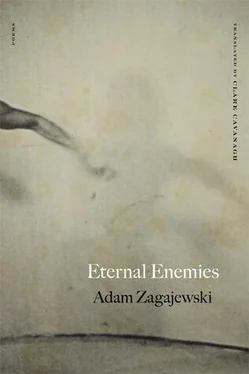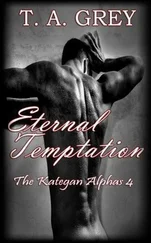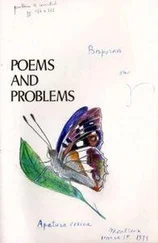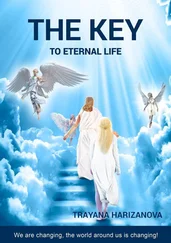But when the plane touched concrete, then
assiduously circled in the airport’s labyrinth,
I once again knew nothing. The darkness
of daily wanderings resumed, the day’s sweet darkness,
the darkness of the voice that counts and measures,
remembers and forgets.
Sunday morning, the wind has washed our minds,
the streets are bleak as a monastic regimen.
The young still sleep in their white tents,
and only the elderly head churchwards.
A ginkgo, still clinging to its leaves,
aglow with autumn’s yellow fire,
announces that the moment has arrived.
Sunday morning, above the roofs of palaces and houses,
somber chimes hold conversations
while little bells laugh; Dominicans
and Norbertines exchanging telegrams.
Clad in bronze, the Planty Garden monuments
doubtless long for normal skin,
for flesh and aching heads, but eternity has its demands.
We quarreled here once, do you remember,
I looked for you in evening’s labyrinth;
I held a book, you wore a summer dress
(the book went unread, but the dress spread
like the jacket of a Neoplatonic tract).
A bronze Boy-Zelenski gazed at me, his eyes
retained the image of a firing squad,
that masterpiece of Prussian architecture.
The wind washed minds and streets, it washed the sun.
Georg Trakl died a few hundred yards away,
killed by ecstasy or despair.
And we sat on that bench late one night
and tried to hear the ocean.
The moon was full, the stars ran quietly.
The moment came, after long negotiations,
broken off and taken up, abandoned once again,
when the past, wise and dry as parchments,
decided to make peace with petty day,
with the morning’s improvisation, its damp breath,
my thoughts’ dampness, my unrest,
and a delegation of the dead — poets, but also night watchmen,
experienced students of the darkness, and midwives,
who knew how bodies opened—
agreed that it was high time,
in silence, Sunday morning, when trees
flame peacefully, agreed conditionally
that I should wake and realize that the moment had arrived,
the moment had arrived — and would be gone.
I try to envision his last winter,
London, cold and damp, the snow’s curt kisses
on empty streets, the Thames’s black water,
chilled prostitutes lit bonfires in the park.
Vast locomotives sobbed somewhere in the night.
The workers spoke so quickly in the pub
that he couldn’t catch a single word.
Perhaps Europe was richer and at peace,
but the Belgians still tormented the Congo.
And Russia? Its tyranny? Siberia?
He spent evenings staring at the shutters.
He couldn’t concentrate, rewrote old work,
reread young Marx for days on end,
and secretly admired that ambitious author.
He still had faith in his fantastic vision,
but in moments of doubt
he worried that he’d given the world
just a new version of despair;
then he’d close his eyes and see nothing
but the scarlet darkness of his lids.
The sun sets and prying pelicans fly just above the sea’s smooth skin;
you watch a fisherman killing a caught fish, invincibly convinced of his humanity,
while rosy clouds commence their slow, solemn march to the night’s foothills—
you stay a moment, waiting to see dolphins
— maybe they’ll dance their famous, friendly tango once again—
here, on the Gulf of Mexico, where you find tire marks and mussels along the broad beaches,
and energetic crabs that exit the sand like workers deserting a subterranean factory en masse.
You notice abandoned, rusty loading towers.
You walk along a stone lock and wave to a few anglers,
modest types, fishing not for sport, just in hope
of postponing the last supper.
A vast, brick-red ship from Monrovia sails up the port canal
like some bizarre imaginary beast boasting of its own oddness,
and briefly blocks the horizon.
You think: it’s worth seeking the backwaters, provincial spots
that remember much, but are uncommonly discreet,
quiet, humble places, rich, though, in caches, hidden pockets of memory like hunters’ jackets in the fall,
the bustling town’s outskirts, wastelands where nothing happens, there are no famous actors,
politicians and journalists don’t appear,
but sometimes poetry is born in emptiness,
and you start to think that your childhood halted here,
here, far from long-familiar streets—
since absence after all can’t calculate distance in light-years or kilometers,
instead it calmly waits for your return, doubtless wondering what’s become of you. It meets you without fanfare and says:
Don’t you know me? I’m a stamp from your vanished collection,
I’m the stamp that showed you
your first dolphin on a backdrop of unreal, misty blue. I’m the sign of travel.
Unmoving.
Someone was tuning the organ in an empty church.
In a Gothic hall a waterfall boomed.
The voices of the tortured and schoolchildren’s laughter
mixed with my vertical breath.
In an empty church someone tuned the organ
and tinkered with the pipes’ wild anarchy,
demolished houses, flung thunderbolts, then built
a city, airport, highway, stadium.
If only I could see the organist!
Catch sight of his face, his eyes!
If I could trace the movements of his hands,
I might understand where he’s taking us,
us and those for whom we care,
children, animals, shadows.
I scrutinize firemen’s helmets
which reflect clouds
and a microscopic glider.
The fire will start up soon,
in an hour or so.
Beauty and fear are always paired—
like the time I learned
Marek had died and wandered
through a cold Paris, from which
summer was slowly departing.
A BIRD SINGS IN THE EVENING
Above the vast city, plunged in darkness,
breathing slowly, as if its earth were scorched,
you, who sang once for Homer
and for Cromwell, maybe even
over Joan of Arc’s gray ashes,
you raise your sweet lament again,
your bright keening; no one hears you,
only in the lilac’s black leaves, where
unseen artists hide,
a nightingale stirred, a little envious.
No one hears you, the city is in mourning
for its splendid days, days of greatness,
when it too could grieve
in an almost human voice.
WAIT FOR AN AUTUMN DAY (FROM EKELÖF)
Wait for an autumn day, for a slightly
weary sun, for dusty air,
a pale day’s weather.
Wait for the maple’s rough, brown leaves,
etched like an old man’s hands,
for chestnuts and acorns,
for an evening when you sit in the garden
with a notebook and the bonfire’s smoke contains
the heady taste of ungettable wisdom.
Wait for afternoons shorter than an athlete’s breath,
for a truce among the clouds,
for the silence of trees,
for the moment when you reach absolute peace
and accept the thought that what you’ve lost
is gone for good.
Wait for the moment when you might not
even miss those you loved
who are no more.
Wait for a bright, high day,
for an hour without doubt or pain.
Wait for an autumn day.
KATHLEEN FERRIER (1912–1953)
Читать дальше












